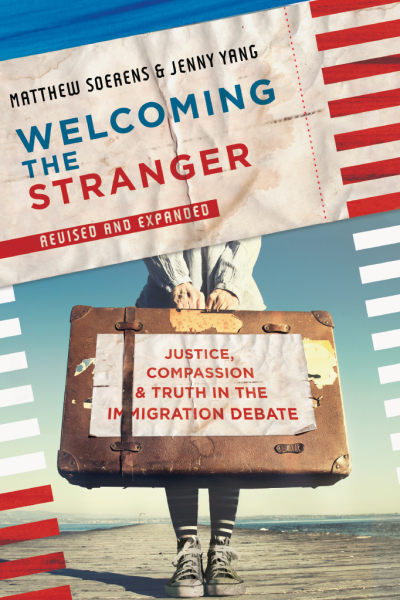Why Are 2 of 3 White Evangelicals Opposed to Helping Refugees? World Relief Director Responds

As research shows that white evangelicals are the least likely demographic to believe that the United States has a responsibility to accept refugees into the country, a leading evangelical humanitarian activist has warned that many evangelicals and Americans may have misguided views about who refugees are as the U.S. turns its back against them.
Matthew Soerens, the director of church mobilization at the evangelical refugee resettlement organization World Relief, told The Christian Post Thursday that there has been a large shift in the past 10 years when it comes to evangelical leaders calling for compassion on immigration issues. However, that doesn't seem to have impacted the views on refugees of the evangelical rank-and-file.

A Pew Research poll released last month shows that more than two out of three white evangelical Protestants (68 percent) believe that the United States is not responsible for accepting refugees.
The polling comes as the Trump administration — backed by overwhelming support from the white evangelical community — has drastically reduced the number of refugees coming into the country per year.
Although evangelicals seem to care deeply about Christian persecution in the Middle East, Soerens said that the Trump administration refugee policies have effectively "turned [the nation's] back on the persecuted church in the Middle East."
"[Evangelical] views on refugees are quite negative and that took us by surprise at World Relief because for the longest time in my career, refugees were like the easy part of our work — they have legal status and they all, by definition, have a sympathetic story of fleeing persecution," Soerens said. "Other immigrants, especially those who are undocumented, that is where it got controversial. Everybody liked refugees, at least that was kind of our operating assumption. Maybe it was that I was wrong."
Soerens believes the conception of who refugees are has changed in the minds of many Americans to the point that many fear the idea of resettling refugees.
"I think a big part of the shift is that people used to think about refugees and it was the former Soviet Union or it was Rwandan and if you back far enough, Vietnamese," Soerens said. "Now, people's image of refugees coming to the U.S. — though it isn't necessarily accurate — is Syrian. That's the sort of narrative that is incomplete that has changed people's views."

Later this month, Soerens and with his World Relief colleague Jenny Yang will release an updated version of their 2006 book Welcoming the Stranger: Justice, Compassion & Truth in the Immigration Debate.
Part of the reason for the update is to highlight shifts in thinking on immigration that have occured within the evangelical community since they wrote the first book, and to make the case of why immigrants are blessings to the Church.
"I used to think that people knew that refugees had been through this comprehensive screening process [to enter the United States]," Soerens told CP. "It is clear that a lot of Americans didn't know that and maybe are even confusing these categories and don't understand that a refugee, by definition, has fled persecution and has gone through a vetting process and that they are less than one percent of the refugees globally that the U.S. has invited into the country."
While it is hard to point out a reason why many Americans might have misconceptions about refugees fleeing persecution in search of peace and safety, Soerens suggests part of the reason might be the fact that Trump has done his part to contribute to those misconceptions.
"Frankly, when the president says that 'we have no idea who these people are,' he is helping to contribute to those misconceptions," Soerens said. "The Department of Homeland Security knows an awful lot about those people. They have individually vetted each one of them and have worked with the FBI, the National Counterterrorism Center, the Department of Defense, with the State Department."
Soerens said that many people will hear the term "Middle East" in relation to refugees and automatically think "Muslim." Although the region is predominantly Muslim, only a little more than half of refugees coming to the U.S. from the Middle East are Muslim. Soerens said that over the past decade, one-third of refugees from the Middle East have been Christians fleeing persecution.
The Trump administration is on pace to resettle just about 22,000 refugees fleeing persecution by the end of fiscal year 2018, which would fall way short of the 45,000 refugee cap that was set at the beginning of the fiscal year and was already the lowest refugee resettlement cap set by a president since 1980.
"They pulled off the staff, the DHS officers who were screening people and vetting people," Soerens said. "The number of people who are making those rounds are way, way down. In some cases, they are not going to particular countries at all. I pulled the stats on the Middle East. It has been a very, very small number of refugees coming from the Middle East in the last six months."
"About a third [of refugees from the Middle East in the past decade] have been Christians, who are refugees who fled persecution because of their Christian faith. Those people are almost entirely being shut out along with persecuted Muslims," Soerens said. "I don't think people are getting that. To the extent that people have heard that there are less refugees coming in, I don't think that most Christians realized that as a nation, we have kind of turned our back on the persecuted church in the Middle East."
Soerens explained that the immigration and refugee issue is not the reason why evangelical approval of the president is so high. Although evangelicals widely supported Trump in the 2016 campaign, the Pew polling is not indicative of the shift on immigration that has seemingly occured over the last decade in evangelical leadership.
"We have seen a really significant shift there since we wrote the first edition of this book in 2009. When we wrote the first book, it was hard to find leaders [to speak out]," Soerens said. "Beyond Latino evangelicals and looking into the evangelical institutions, it was difficult to find any that had an opinion on immigration they were willing to talk about it publicly."
Today, finding evangelical leaders to issue a public comment on immigration and refugee issues is not as much of a challenge.
The Evangelical Immigration Table — which consists of prominent evangelicals like Russell Moore and Samuel Rodriguez — has on multiple instances issued statements of concern relating to Trump's immigration and refugee policies.
In addition, the nation's largest protestant denomination — the Southern Baptist Convention — has also shifted its views on immigration in the past several years.
This week, the convention passed a strengthened resolution on immigration that not only called for "family unity" at a time that the Trump administration has increased the separation of immigrant families at the border, but has also called for a earned path to legal status for certain undocumented immigrants.
The SBC resolution also calls for churches and families to be encouraged "to welcome and adopt refugees into their churches and homes as a means to demonstrate to the nations that our God longs for every tribe, tongue, and nation to be welcomed at His throne."
"In 2011, the SBC resolution passed with 49 percent of the messengers in Phoenix wanting to strip all language about policy from the resolution. Since 51 percent wanted to keep it, it was in it. But, it shows how divisive it was in 2011 among Baptists," Soerens said. "Two days ago, the resolution passed, from what I understand, with a 99 percent vote. The resolution was significantly stronger in terms of what it is calling for than what 2011's was. It was done nearly unanimous."
Soerens said that there has definitely been a shift in evangelical views relating to illegal immigrants and a path to legal status. Yet, there has been "a lot of anonymity" from evangelical leaders when it comes to the issue.
Another aspect highlighted in the updated book, Soerens said, was the fact that immigrants and ethnic minorities have increasingly become a much larger chunk of American evangelicalism over the past decade.
"That is particularly true amongst the Hispanic community. If it wasn't for immigrants and their children — Hispanics, Asian, African-American, Caribbean — there would be a lot fewer evangelical Christians in the United States," he said.
"Since we wrote the first edition of the book, Pew did their Religious Landscape Study in 2014. The headlines under that study are 'American Christianity is in decline.' A lot of evangelicals were quick to note that Catholicism and mainline Protestants are on the decline and evangelicalism is kind of flatlined. We were awfully proud of that flatline," he continued. "But if you look even deeper, white evangelicalism is on a decline similar to Catholicism and mainline Protestantism. Non-white evangelicals are an increasingly large share of American evangelicals. That is not all from immigration but it is significantly related to immigration from Latin America, from Asia, from Africa."




























